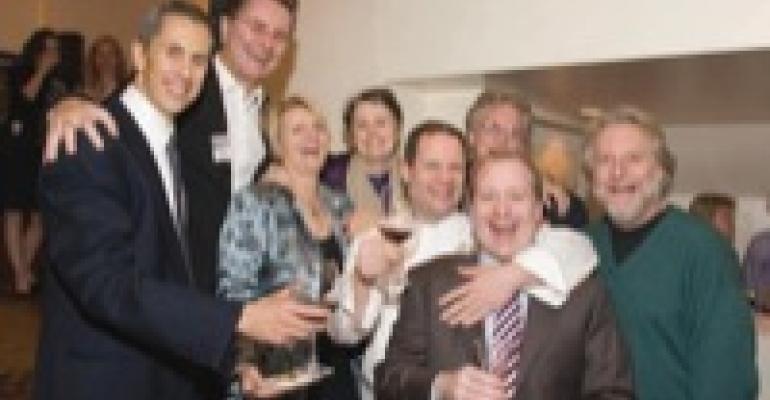 |
| TWO DeCADes: Danny Meyer (l.) and friends celebrate the 20th anniversary of Union square Cafe. |
 |
General business books can be useful for restaurant owners, but only up to a point. Authors who work in this genre typically espouse a few worthy principles, then illustrate them via examples drawn from companies far-removed from the restaurant world. The lessons might be transforming for some organizations, but rarely is it clear how you would apply most of them day-to-day in full-service operations.
No more. Much-respected Union Square Hospitality Group head Danny Meyer has written a business book that, while aimed at a mass audience, is one in which every principle is illustrated many times over by examples drawn from his string of 11 New York City restaurants.
And not only is the quality of his information high; there's a lot of it (320 pages worth) and—who knew—Meyer turns out to be a sharp writer and a good story teller, to boot. All of which makes Setting the Table: The Transforming Power of Hospitality in Business (Harper Collins, $25.95) a rich resource for any RH reader.
Meyer takes a counterintuitive approach to hospitality. Employees come first, even ahead of customers. Meyer wants his restaurants to deliver "enlightened hospitality," i.e., to pay close attention to how the delivery of the food product makes its recipient feel. To do this a restaurant has to, above all, get and keep employees who are empathetic.
"The overarching concern to do the right thing well is something we can't train for," Meyer says. "Either it's there or it isn't. So we need to train how to hire for it."
This is just one out of several hundred nuggets of practical, full-service restaurantspecific information in this book. The best part is that you'll get to see them develop from the business missteps Meyer makes as he brings his 11 restaurants to life and tries to turn each of them into longterm institutions.
To boil Meyer's operating philosophy down to a single phrase, it's making customers feel that he and his staff are on the customer's side. It doesn't mean being a pushover or giving a lot of freebies away; it means making a recipient feel good about the transaction with you.
Meyer is an able explainer of why he does things the way he does. You couldn't hire someone of his caliber to come and give you this level of advice at any price, let alone one who would be as entertaining as Meyer turns out to be on the page.
His take on the restaurant business has worked well for him, but it can easily work just as well for others, and it accessible to operators in any segment. If any restaurant-specific business book could ever be described as a page-turner, this is the one.
| The Starbucks Experience: 5 Principles for Turning Ordinary into Extraordinary Horsemen of the Esophagus So what's in this book for you? For certain operations, one-shot competitive eating events provide a promotional boost that costs very little and lasts a long time. Other operators use a scaled-down versions of these contests as an attention-getting device year-round. As for the competitive eating subculture Fagone unearths, it's disturbing in parts, yet entertaining as a whole. |


 This book covers territory similar to that of Danny Meyer's, only from a limited-service beverage business perspective. Michelli shows readers how Starbucks draws its customers in, builds its legendary brand loyalty and retains its all-important front line staff. Yes, we've heard the story of Starbucks' march to coffeehouse dominance before (four times if we're counting right) and previous authors were often guys who worked at the company (Starbucks founder Howard Schultz, et al.). Yet Michelli, a consultant with exceptional internal access, still comes up with plenty of actionable tips for anyone who does business in a foodservice setting. If Meyer hadn't gotten there first, this would be the perfect book to read as you set your business priorities for 2007. We say, why not spring for both?
This book covers territory similar to that of Danny Meyer's, only from a limited-service beverage business perspective. Michelli shows readers how Starbucks draws its customers in, builds its legendary brand loyalty and retains its all-important front line staff. Yes, we've heard the story of Starbucks' march to coffeehouse dominance before (four times if we're counting right) and previous authors were often guys who worked at the company (Starbucks founder Howard Schultz, et al.). Yet Michelli, a consultant with exceptional internal access, still comes up with plenty of actionable tips for anyone who does business in a foodservice setting. If Meyer hadn't gotten there first, this would be the perfect book to read as you set your business priorities for 2007. We say, why not spring for both? You can perhaps imagine what might ensue if a topnotch reporter with a taste for the offbeat was turned loose on the competitive eating circuit, and this book doesn't disappoint. Fagone treks to 27 International Federation of Competitive Eating-sanctioned events and brings back tales that make the contest you're probably most familiar with—the Nathan's Famous Fourth of July International Hot Dog-eating extravaganza that has lately been broadcast live on ESPN—seem tame by comparison. The contestants you see there are, as Fagone points out, actually the most normal ones of the bunch.
You can perhaps imagine what might ensue if a topnotch reporter with a taste for the offbeat was turned loose on the competitive eating circuit, and this book doesn't disappoint. Fagone treks to 27 International Federation of Competitive Eating-sanctioned events and brings back tales that make the contest you're probably most familiar with—the Nathan's Famous Fourth of July International Hot Dog-eating extravaganza that has lately been broadcast live on ESPN—seem tame by comparison. The contestants you see there are, as Fagone points out, actually the most normal ones of the bunch.


